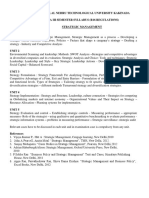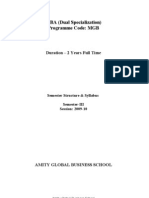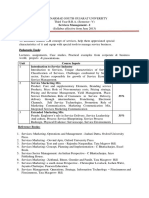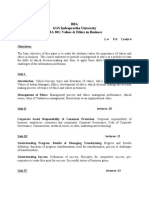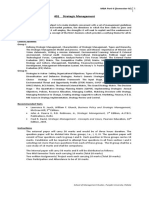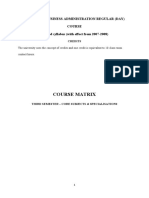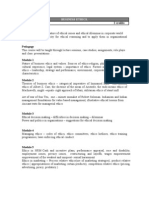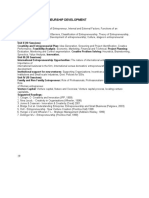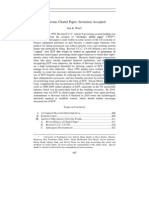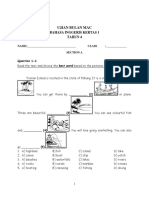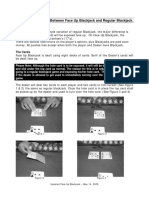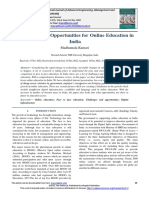MBA - 301: Corporate Strategy
Max. Marks External Internal Time Credits
100 70 30 3 Hours 4
Note: The examiner will set nine questions in all. Question No. 1, comprising of five short answer type
questions of 4 marks each, shall be compulsory. From the remaining 8 questions of 10 marks each, a student
is required to attempt five questions.
Course Outcomes: After completing this course, the students will be able to:
MBA – 301.1 Get awareness about the way strategic thinking shapes the organization.
MBA – 301.2 Get grooming to adopt strategic thinking from organization’s perspective.
MBA – 301.3 Understand various tools and techniques governing corporate strategy.
MBA – 301.4 Comprehend strategic outlook governing corporate sector.
Course Contents:
An Introduction to Business Policy — Nature, objective and importance of business policy; Strategic
Management –meaning, historical evolution and significance to contemporary organizations. Strategic
Management Process, levels of strategy in organization.
Strategy Formulation- Company's mission, purpose and objectives; corporate strategy - concept, significance
and objectives; Generic strategies.
Environmental and organizational appraisal (Internal & external) techniques of business environment analysis,
Strategic alternatives and choice; Business ethics and corporate strategy. Concept of value chain and
competitive advantage.
Strategy implementation - Designing organizational structure and activating strategies; matching structure and
activating strategy, Structural, Behavioral and Functional implementation, concept of synergy.
Strategy Evaluation - Strategic evaluation and Control, Strategic and Operational Control; techniques of
evaluation and control. Role of organizational system in evaluation.
Current trends in Strategic management- trends in external environment of business, new directions in strategic
thinking and new modes of leadership. Digital transformation of businesses – A strategic perspective.
Note: In addition, teacher conducting the course will announce 8-10 case studies at the commencement of
session for deeper understanding of strategic perspective of businesses for discussion in tutorial classes during
the session.
Suggested Readings:
1. Jauch & Glueek : Business Policy and Strategic Management.
2. Thampson LA. and Stickland A.J.: Strategic Management - Concept and cases.
3. Michael Potter: Competitive Advantage of Nations.
4. Azhar Kazmi : Business Policy and Strategic Management.
5. Kennth, A. Andrews: Concepts of corporate Strategy.
6. Melvin J. Stanford: Management Policy
7. John A. Pearce Hand R.B. Robinson Strategic Management
8. Applegate, Corporate Information Strategy and Management,8 th edn McGraw Hill Education
9. Thompson, Crafting and Executing Strategy, 19th Ed. McGraw Hill Education
21
�MBA - 302: Indian Ethos and Business Ethics
Max. Marks External Internal Time Credits
100 70 30 3 Hours 4
Note: The examiner will set nine questions in all. Question No. 1, comprising of five short answer type questions
of 4 marks each, shall be compulsory. From the remaining 8 questions of 10 marks each, a student is required
to attempt five questions.
Course Outcomes: After completing this course, the students will be able to:
MBA – 302.1 Understand basic concepts of Indian Ethos and Business Ethics.
MBA – 302.2 Embrace value system in decision making.
MBA – 302.3 Know the role of Indian Wisdom for managers.
Recognize organizational challenges to ethical behavior and ethical dilemma
MBA – 302.4
resolution process.
Course Contents: Understanding need for Ethics, ethical values, myths and ambiguity, Ethics v/s Ethos,
Theories of Ethics, Absolutism verses Relativism, Teleological approach, the Deontological approach,
Kohlberg’s six stages of moral development, Ethical Principles in Business.
Indian wisdom & Indian approaches towards business ethics: Tenets of Indian cultural heritage, R ole of Indian
Ethos in Managerial Practices, Scriptures in understanding ethics: Management Lessons from Vedas, Mahabharata,
Bible, and Quran. Indian v/s Western Management styles.
Work Ethos and Values for Indian Managers- Relevance of value based management in global perspective-
Impact of values on stakeholders, Trans-cultural human values, Secular v/s spiritual values, Value Systems and
work cultures.
Indian Systems of Learning-Gurukul system of learning, Karma philosophy and its importance to Managers-
Nishkama Karma- Laws of Karma, Law of Creation- Law of Humility- Law of Growth- Law of Responsibility-
Law of connection - Corporate Karma Leadership.
Ethical tenets of organization culture, developing codes of ethics and conduct, Ethical decision making, ethical
reasoning, ethical and value based leadership, Ethical dilemmas in different business areas of operations,
finance, marketing HRM and international business, ethical dilemma resolution process.
Note: In addition, teacher conducting the course will announce 8-10 case studies at the commencement of
session for deeper understanding of Indian perspective of businesses for discussion in tutorial classes during
the session.
Suggested Readings:
1 Ahmedabad Management Association (AMA), “Ancient Indian Wisdom for Self-Development”, Ahmedabad, 1995.
2 Bowle N.E. and Duska R.F., “Business Ethics”, New Jersey, Prentice Hall Inc., 1990.
3 Brately Peter, “The Essence of Business Ethics”, New Delhi, Prentice Hall of India, 1997.
4 B.K.S. Iyengar, Light on Life, Rodale Publishers, 2005.
5 Chakraborty S.K., “Management Transformation by Values”, New Delhi, Sage Publication, 1990.
6 Chakraborty S.K., Chakraborty Debangshu, Spirituality in Management: Means Or End?, Oxford University Press, 2008.
7 Chakraborty, S.K., Ethics in Management-Vedantic Approach, New Delhi, Oxford India Ltd. 1995.
8 Fernando A.C., Business Ethics: An Indian Perspective, Pearson, 2009.
9 Gini Al, Case Studies in Business Ethics, 6th edition, Pearson Education, 2009.
10 Jitatmananda Swami, Indian Ethos for Management, Rajkot, Ramakrishna Ashrama, 1996.
22
� MARKETING
SEMESTER-III
MM - 301: Advertising Management
Max. Marks External Internal Time Credits
100 70 30 3 Hours 4
Note: The examiner will set nine questions in all. Question No. 1, comprising of five short answer type
questions of 4 marks each, shall be compulsory. From the remaining 8 questions of 10 marks each, a student
is required to attempt five questions.
Course Outcomes: After completing this course, the students will be able to:
MM - 301.1 Comprehend the significance of advertising in acquiring and retaining
customers.
MM - 301.2 Learn the techniques and processes involved in the dynamic area of advertising.
MM - 301.3 Devise an advertising plan that give a kickstart to the company in attaining its
broad marketing objectives.
MM - 301.4 Learn newer and would be future activities reshaping the field of advertising.
Course Content:
Understanding advertising: Concept, evolution, purpose and classification. Advertising and society: ethical
issues in advertising, social criticism of advertising, Laws in advertising, advertising bodies in India.
Advertising strategy and planning process, Consumer behavior and advertising research, Advertising agency;
types, functions and structure of advertising agency, client-agency relationship; Building of advertising
programme - message, headlines, copy, logo, illustration, appeal, and the layout.
Media planning and strategy – development of media plan, establishing media objectives, developing and
implementing media strategies, evaluation and follow up of media plan; Budgeting- establishment and
allocation and budgeting approaches. Measuring the effectiveness of the promotional program- Market testing,
pre testing, post testing, laboratory tests and field tests.
Online advertising: objectives, importance, types and challenges of online advertising, advertising on the
internet, social network platforms and measuring effectiveness of internet advertising.
Note: In addition, teacher conducting the course will announce 8-10 case studies at the commencement of
session for deeper understanding of the constrained optimization for managerial decision making for discussion
in tutorial classes during the session.
Suggested Readings:
1. Belch, George E and Belch, Michael A. : Introduction to Advertising and Promotion, 3rd ed, Chicago,
Irwin, 2002.
2. Jethwaney and Jain: Advertising Management, Oxford, 2012.
3. Sandage and Fryberger : Advertising, AITBS, Delhi, 2000.
4. Batra, Rajeev, Myers, johan G. and Aaker, David A. Advertising Management, 9th ed., New Delhi,
Pearson, 2013.
5. O, Guinn : Advertising & Integrated Brand Production, Vikas Publishing House, New Delhi.
43
�MM - 302: Marketing Research and Analytics
Max. Marks External Internal Time Credits
100 70 30 3 Hours 4
Note: The examiner will set nine questions in all. Question No. 1, comprising of five short answer type
questions of 4 marks each, shall be compulsory. From the remaining 8 questions of 10 marks each, a student
is required to attempt five questions.
Course Outcomes: After completing this course, the students will be able to:
MM - 302.1 Get insights on research activities in the marketing ecosystem.
MM - 302.2 Devise a detailed marketing plan concerning any marketing situation faced by
the company.
MM - 302.3 Get in-depth knowledge of tools and techniques involved in marketing research.
MM - 302.4 Get inputs on tremendous scope of Analytics in the field of marketing.
Course Contents:
Marketing Research: concept, process and role of research in marketing. Perspectives and dynamics of
Marketing Research. Market Potential Research, Image Research and Research based on (4) Ps of marketing.
Consumer research: Issues and dynamics, research issue identification, consumer research ecosystem and
challenges.
Marketing Research design and its applications: Exploratory Research, Descriptive Research and Experimental
Research designs.
Marketing Research process: Preparation of research blueprint, survey instrument, measurement and scaling
tools, data collection and sampling design. Role of analytics, big data and marketing intelligence in research.
Marketing research tools and methods: Conjoint analysis, Cluster analysis, Factor analysis, Regression
analysis, Perceptual maps and text analytics.
A detailed review of Structural Equation Modeling (SEM) in marketing and consumer research.
Note: In addition, teacher conducting the course will announce 8-10 case studies at the commencement of
session for deeper understanding the dynamics of marketing research for discussion in tutorial classes during
the session.
.
Suggested Readings:
Cooper, Donald R and Pamela S Schindler, Marketing Research- Concepts and Cases, Tata McGraw
Hill Publishing Company Limited, New Delhi.
Malhotra, Naresh K and S Dash, Marketing Research- An Applied Orientation, Pearson.
Boud, Harper W, Westfall, Ralph L and Stanley F Stasch, Marketing Research- Text and Cases, RD
Irwin
Green, Paul E and Donald S Tull, Research for Marketing Decisions, PHI.
Beri, GC, Marketing Research, Tata McGraw Hill, New Delhi.
44
�MM - 304: Consumer Behaviour
Max. Marks External Internal Time Credits
100 70 30 3 Hours 4
Note: The examiner will set nine questions in all. Question No. 1, comprising of five short answer type
questions of 4 marks each, shall be compulsory. From the remaining 8 questions of 10 marks each, a student
is required to attempt five questions.
Course Outcomes: After completing this course, the students will be able to:
MM - 304.1 Get insight on behaviour of consumers so as to make organisations serve them
better.
MM - 304.2 Understand the dynamics of consumer decision making.
MM - 304.3 Know various psychological, social, economic and other influences on consumer
behaviour.
MM - 304.4 Understand various models that have tried to explain consumer behaviour
dynamics.
Course Contents:
Consumer Behavior: Conceptual framework, nature, scope and significance for marketers. Consumer research:
Role and processes. Consumer decision making process: Various stages and underlying marketing
implications.
Psychological factors influencing consumer behavior: Theories and principles of perception, learning,
motivation, personality & self concept and attitude with underlying marketing implications.
Group dynamics and influence of socio-economic, cultural and demographic factors consumer behavior such
as family and reference groups and their marketing implications.
Communicating with Consumers: conceptual framework of opinion leadership and diffusion of innovation
with underlying marketing implications.
Industrial buying behaviour, Consumer behaviour audit. Modeling consumer behavior: A brief overview of
Pavlovian model, economic model, Input, process, output model, Psychological model, Howarth Sheth model,
Sociological model, Family decision making model, Engel-Blackwell-Kollat model, Nicosia Model and
Industrial Buying model.
Note: In addition, teacher conducting the course will announce 8-10 case studies at the commencement of
session for deeper understanding of consumer behavior for discussion in tutorial classes during the session.
Suggested Readings:
1. Schiffman, LG and LL Kanuk, Consumer Behaviour, Pearson Education
2. Blackwell, RD, PW Miniard and JF Angel, Consumer Behaviour, Cengage Learning India Pvt. Ltd.
3. Peter, JP and JC Olson, Consumer Behaviour and Marketing Strategy, McGraw Hill.
4. Handerson, S, Consumer Behaviour in Theory and Action, John Wiley and Sons.
5. Assel,H: Consumer Behaviour- A Strategic Approach, Houghton Miffin.
6. Loudon and A Della, Consumer Behaviour, Tata McGraw Hill.
7. Hawkins, DL, DL Mothersbaugh and Amit Mookerjee, Consumer Behaviour: Building Marketing Strategy, Tata
McGraw Hill Education Pvt. Ltd., 11th Edition.
8. Solomon, Michael R, Consumer Behaviour, Prentice Hall, 10th Edition, 2012.
46
�MM - 306: Digital and Social Media Marketing
Max. Marks External Internal Time Credits
100 70 30 3 Hours 4
Note: The examiner will set nine questions in all. Question No. 1, comprising of five short answer type
questions of 4 marks each, shall be compulsory. From the remaining 8 questions of 10 marks each, a student
is required to attempt five questions.
Course Outcomes: After completing this course, the students will be able to:
MM - 306.1 Get a bird’s eye view of newer technologies shaping modern day marketing.
MM - 306.2 Pin-point how the modern day marketers are empowering themselves with
digitalization.
MM - 306.3 Throw light on various social media platform available for modern day
marketers to showcase themselves.
MM - 306.4 Visualise future of marketing in light of emerging digital and social media
platforms.
Course Contents:
Evolution of Digital marketing from traditional to modern era. Role of Internet; current trends, Info-graphics,
implications for business & society; Emergence of digital marketing as a tool; Drivers of the new marketing
environment; Digital marketing strategy; P.O.E.M. framework, Digital landscape, Digital marketing plan,
Digital marketing models. Search Engine Optimization; introduction, onpage and offpage optimization. Search
Engine Marketing with google AdWords; PPC, Display Advertising. Social Media Marketing; introduction to
social media platforms, Penetration & characteristics; Building a successful social media marketing strategy.
Affiliate marketing & strategic partnerships. Email and mobile marketing; Content and strategies. Google
analytics; meaning, importance and tools.
Note: In addition, teacher conducting the course will announce 8-10 case studies at the commencement of
session for deeper understanding of the digital and social media marketing for discussion in tutorial classes
during the session.
Suggested Readings:
1. Hanson, W and KirthiKalyanam, Internet Marketing and E-Commerce, Cengage Learning, 2015.
2. Mullen, J and D Daniels, E-Marketing- An Hour a Day, Sybex Publisher, First Edition.
3. Chaffey, Dave and Fiona Ellis Chadwick, Digital Marketing- Strategy, Implementation and Practice, Pearson
Education Inc., 2012.
4. Kotler et. Al, Principles of Marketing, Pearson Education Inc., New Delhi, 13th Edition.
5. Kaufman, Era and Chris Hortan, Digital Marketing- Integrating Strategies and Tactics with Values, Routledge,
2014.
6. Ahuja, Vandana, Digital Marketing, Oxford University Press, First Edition.
7. Harvard Business Review, South Asia Edition, India today Group
48
�BA - 305 Data Analytics using R
Max. Marks External Internal Time Credits
100 70 30 3 Hours 4
Note: The examiner will set nine questions in all. Question No. 1, comprising of five short answer type
questions of 4 marks each, shall be compulsory. From the remaining 8 questions of 10 marks each, a student
is required to attempt five questions.
Course Outcomes: After completing this course, the students will be able to:
BA - 305.1 Understand the basics of R.
BA - 305.2 Explore the data in R.
BA - 305.3 perform clustering operation on data.
BA - 305.4 Know the parallel computing with R.
Course Contents:
Introduction to R
Getting Started with R
Loading and Handling Data in R
Exploring Data in R
Linear Regression using R
Logistic Regression
Decision Tree
Time Series in R
Clustering
Association Rules
Text Mining
Parallel Computing with R
Note: In addition, teacher conducting the course will announce 8-10 case studies at the commencement of
session for deeper understanding of the constrained optimization for managerial decision making for discussion
in tutorial classes during the session.
Suggested Readings
1. Seema Acharya.: Data Analytics Using R. McGraw Hill Education
2. Maindonald & Braun : Data Analysis and Graphics Using R,Cambridge University Press
3. Michael Milton: Head First Data Analysis, O'Reilly Media.
4. Rakshit-R Programming for Beginners(McGraw hill education)
128
�BA - 306 Social Media Analytics
Max. Marks External Internal Time Credits
100 70 30 3 Hours 4
Note: The examiner will set nine questions in all. Question No. 1, comprising of five short answer type
questions of 4 marks each, shall be compulsory. From the remaining 8 questions of 10 marks each, a student
is required to attempt five questions.
Course Outcomes: After completing this course, the students will be able to:
BA - 306.1 Understand the basics of social media analytics.
BA - 306.2 Know about the information diffusion.
BA - 306.3 Learn the Geospatial social data mining.
BA - 306.4 Predict the future with social media.
Course Contents:
Phenomenology of social media; Analysis Basics; Sentiment Analysis; Network Analysis Basics; Influence
and Centrality in Social Networks; Information diffusion; Social ties and information diffusion; Social ties and
link prediction; Social Spam and Malicious Behavior; Geospatial social data mining; Privacy in a Networked
World; Predicting the future with social media; Emotional contagion; Social tagging and folksonomies.
Note: In addition, teacher conducting the course will announce 8-10 case studies at the commencement of
session for deeper understanding of the constrained optimization for managerial decision making for discussion
in tutorial classes during the session.
Suggested Readings:
1. Marshall Sponder, Social Media Analytics, McGraw Hill Publication.
2. Siddharatha Chatterjee & Michal Krystyanczuk, Python Social Media Analytics.
3. Matthew Gains, Now Available: Social Media Analytics (techniques and insights for extracting value
out of Social Media).
129




